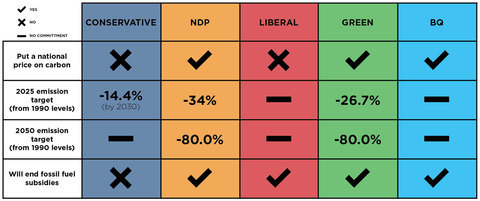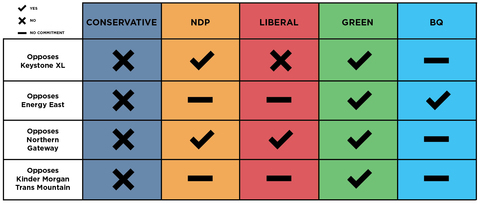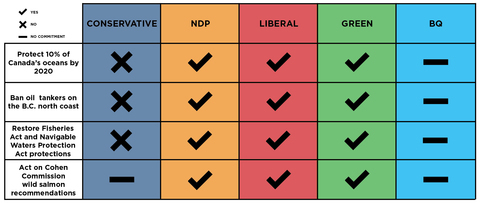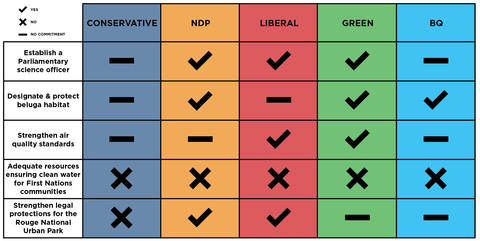David Suzuki's Blog, page 53
October 17, 2015
Join the Blue Dot Movement

Stand with Canadians across our country who are asking all levels of government to recognize our right to breathe fresh air, drink clean water and eat healthy food.
Hey! Want more DSF? Join David Suzuki on Facebook

October 16, 2015
Salmon face an upstream battle in election
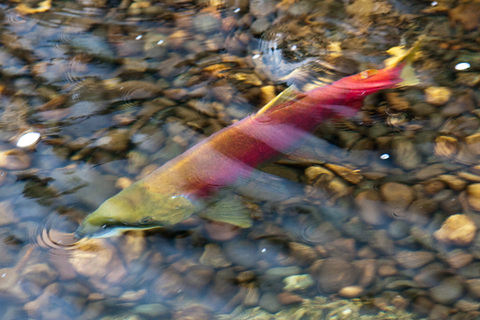
It's not surprising that the federal election issues grabbing attention are focused on people. But we shouldn't ignore the wildlife, like salmon, so central to creating healthy communities across the country. Voters in B.C. want action for salmon.
Ten years ago the federal government released its policy to conserve wild Pacific salmon in Canada. It's known as the Wild Salmon Policy , the blueprint to ensure that Pacific salmon have a prosperous future. The policy provides a framework for government, First Nations, fishers and conservation organizations to work together to protect and reap the benefits from wild salmon. It's a science-based strategy to conserve the full diversity of Pacific salmon, which also gives them the best chance to adapt to climate change. Conservation is balanced with ways to provide the greatest benefits to commercial and recreational fisheries.
Unfortunately for salmon, the most important pieces of the policy remain on paper only. In addition to cuts to science, fisheries monitoring and enforcement within Fisheries and Oceans Canada, weakening of habitat protection under the federal Fisheries Act further diminishes the chances for healthy salmon stocks.
The $37 million Cohen Commission, which investigated the record low returns of Fraser River sockeye salmon in 2009, held the Wild Salmon Policy up in many of its core recommendations, from monitoring and enforcement to removing open net-pen salmon farms from juvenile salmon migration routes. Yet few of those recommendations have been acted on.
Despite a lack of political leadership, there's cooperation on the ground among commercial and recreational fishers, First Nations and conservation groups, which are holding regional roundtables and supporting actions, like leading fish counts, using their own resources. Remaining federal fisheries staff have faced challenges in assisting these efforts, with their resources stretched thin.
Canada's next federal government has a clear path forward if it wants to protect Pacific salmon: follow the Wild Salmon Policy to ensure B.C.'s wild salmon will be here, and healthy, for generations to come.
Hey! Want more DSF? Join David Suzuki on Facebook

October 15, 2015
Let's vote for the values that make Canada great
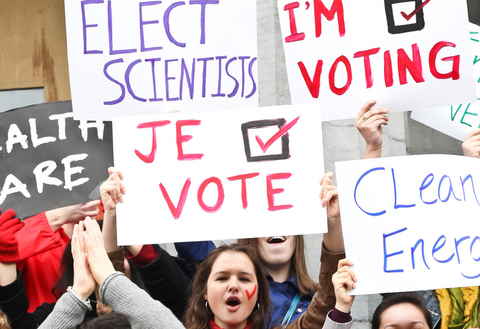
(Credit: Adam Scotti via Flickr)
When my grandparents arrived from Japan in the early 1900s, Canada was far less tolerant than it is today. Women and minorities couldn't vote, nor could Indigenous people who had lived here from time immemorial. In 1942, the government took away my Canadian-born family's property and rights and sent us to an internment camp in the B.C. Interior simply because of our ancestry.
Canada has come a long way in my lifetime. Women can vote, as can Asians, other minorities and Indigenous people. Homosexuality is no longer a crime punishable by imprisonment, as it was until 1969. We've learned to take better care of each other through rational social programs like universal health care, welfare and unemployment insurance, and a culture of tolerance for the many people from diverse backgrounds who contribute so much to our peace and prosperity -- many of whom came here as refugees or immigrants seeking better lives.
Because of my family background and all I've witnessed, I take democracy and voting seriously. That's why I'm dismayed to see the current federal election descend into a divisive discourse that reminds me of all we've worked to overcome.
Canada is the envy of the world, thanks to our diverse population and the politicians from all parties who have steered us on a course of increasing tolerance and acceptance. Despite our differences, we've built a country that has avoided much of the insanity afflicting our neighbours to the south, such as mass shootings, rampant racism and politicians who reject science and, apparently, rational thought.
Canada isn't perfect, but if we want to continue down a progressive path we must talk about the real challenges facing our country, including maintaining and strengthening our respect for diversity. This election should also be about our response to the greatest threat humanity faces, climate change, and the many ways we can confront it by moving to a clean-energy future that will benefit our health, well-being and economy.
We should be talking about the challenges faced by First Nations, Inuit and Metis people, many of whom don't have access to clean drinking water and who are still overcoming the effects of the systemic racism perpetrated in residential schools. We should be talking about ethics, the Senate, corruption and the ways in which our political leaders communicate -- or not -- to us. We should be talking about trade deals, endangered species, protecting water resources, our responsibilities to the rest of the world and so much more.
Instead, this election has bogged down into "dead cat" distractions like niqabs, an issue that affects almost no one! Many people see the niqab as a symbol of women's oppression, but this isn't about protecting women's rights. Whether or not we agree with the custom of wearing niqabs -- or burkas or turbans or beards, or the Christian fundamentalist belief that women should submit to their husbands -- our Constitution guarantees the right of people to practise their religions as long as doing so doesn't impinge on the rights of others. Our courts have repeatedly reaffirmed these rights. Very few women have even asked to wear veils at the citizenship ceremony, and those who do must remove the face covering for identification beforehand.
For any party to stoop to or fall for this deflection is deplorable and un-Canadian. For voters to allow this small-minded bigotry to distract them from issues that really matter is a step backwards. History has shown where scapegoating minorities can lead.
Fortunately, most Canadians share the values of tolerance and acceptance. And most want a government that leads on issues that matter. A recent poll by the Environics Institute for Survey Research and the David Suzuki Foundation found a strong majority of Canadians want the government to take action to reduce greenhouse gas emissions and confront climate change. It also showed Canadians have confidence in the renewable energy sector and support carbon pricing through carbon taxes or cap-and-trade.
In the final days of this long election, we must demand more from those who hope to govern us. We need to ensure that this election is decided on real issues that affect all Canadians, and not on pointless distractions. Most importantly, we all need to get out and vote! Our country's future is at stake.
YES, I'm voting on October 19.
Hey! Want more DSF? Join David Suzuki on Facebook

October 14, 2015
Election environmental cheat sheet
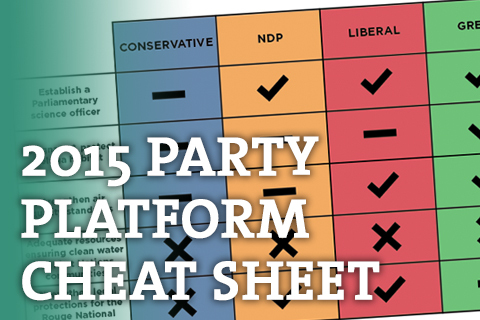
It's been a long election campaign, with all the main political parties making seemingly thousands of promises. If you're feeling confused, don't worry. We're here to help.
The David Suzuki Foundation's policy experts have reviewed the parties' environmental platforms and compared their commitments in an at-a-glance cheat sheet.
To download the full sheet, click here. To see a section-by-section breakdown, keep reading.
Once you're ready to vote, make plans with a friend to go to the polling station on October 19. Making voting plans increases the chances that you and your voting buddy will follow through on election day. Plus, you'll have more fun!
If the images below are too small, click to see them full size.
Right to a healthy environment
Only the NDP and Green Party have made specific commitments to recognizing our right to live in a healthy environment through law. The other parties haven't made firm commitments, but they haven't officially opposed the concept.
Climate change
Climate change targets are tricky. All parties except the Liberals have committed to some measure of national emissions targets. The Liberal Party has said it would allow provinces to set their framework but hold them to emission reductions targets that we will work out together.
The NDP and Bloc Québécois are both in favour of a cap-and-trade system for putting a price on carbon, the Green Party is in favour of a fee-and-dividend program and the Conservative Party does not believe in putting a national price on carbon.
Pipelines
The David Suzuki Foundation opposes expansion of fossil fuel infrastructure because current science suggests two-thirds of existing reserves must remain in the ground to prevent climate change beyond 2 C -- the level at which catastrophic impacts become inevitable.
The Conservative Party is in favour of expanding fossil fuel infrastructure and supports pipeline expansion. The Green Party is opposed to all four of these proposed pipelines. The Bloc is against Energy East, but has not commented on the other projects.
The Liberal Party supports Keystone XL, opposes Northern Gateway and says it will wait until the NEB review process is over before taking a position on Energy East or Kinder Morgan.
The NDP's position is more nuanced. The party opposes both Keystone XL and Northern Gateway. For Energy East and Kinder Morgan, the party has characterized the current NEB process as fundamentally flawed and would reject any decisions coming from it. Instead, the NDP proposes to overhaul the NEB process, strengthening its powers and transparency, and thus creating a more robust decision-making process.
Transit investment
The David Suzuki Foundation supports investment in fast and reliable transit and transportation infrastructure, as studies show that transportation is a major source of carbon pollution across the country. Relying too heavily on private vehicle ownership leads to adverse environmental and public health consequences. We also know these investments reduce costly gridlock and improve regional economies.
For the comparison, we took a look at transit funding commitments for the next four years combined, and then another look at whether the parties had longer-term plans for stable funding. The Conservative Party has pledged to continue funding from its last budget and announced a long-term plan of $1 billion a year. This funding is contingent on projects being funded through public-private partnerships.
The NDP has promised funding that rises to $1.3 billion a year by the end of its first mandate by adding funding commitments on top of what the Conservatives have promised. The NDP is also planning to increase gas tax transfers for transit in addition to a targeted transit plan. This number is part of the combined total.
The Green Party's investments focus on VIA Rail, and while the party also references investments in infrastructure, the amounts for transit are not broken out separately.
The Liberal Party has pledged $5.65 billion over the first four years of its mandate, followed by $2 billion a year for 10 years. Finally, the BQ has said it would call for $10 billion a year in transit investment with no indication of an end date to that level of investment.
Oceans
On ocean issues, the main opposition parties are mostly in alignment, with the exception of the Bloc, which does not have specific commitments in these areas. The NDP, Liberals and Greens all support establishing marine protected areas that cover 10 per cent of Canada's oceans by 2020, tanker bans on B.C.'s north coast and restoring the protections stripped from the Fisheries Act and Navigable Waters Protection Act. The Conservative Party stripped those protections in the first place, is not in favour of a tanker ban and to date have not moved forward on marine protected areas despite repeated commitments to do so.
Other
The Liberals, NDP and Greens all pledge to establish a science officer position to advocate for science-based decision-making. A few weeks ago, the David Suzuki Foundation asked all parties whether they would support establishing protected beluga habitat in the St. Lawrence within the first 100 days, and only the NDP, Green Party and BQ responded in support.
The Liberals and Greens both have measures to strengthen air quality and the Liberals and NDP have pledged protections for the Rouge National Urban Park.
Finally, while some parties have commitments to address clean water access in First Nations communities, none reaches the level the Foundation has advocated for based on the position of the Assembly of First Nations.
YES, I'm voting on October 19.
Hey! Want more DSF? Join David Suzuki on Facebook

What's inside Dirty-Dozen-free personal care products?

Dirty-Dozen-free products may be more expensive because they're produced in smaller batches, contain less water and have shorter shelf life. (Credit: Linda Mackie)
To avoid the Dirty Dozen ingredients in cosmetics we must process the information ("I've been slathering what on my where and it causes cancer, interferes with hormone function or it's harmful to fish and wildlife!"), learn how do to dispose of products we no longer want AND find products that work.
It hasn't always been easy.
I asked Jean and Karen of Pure + Simple @PureAndSimpleCA your questions about Dirty-Dozen-free products:
What preservatives replace parabens?
We use Japanese honeysuckle for products that need to be more alkaline and we're exploring others from the Ecocert preservatives list.
For lower pH products, we use two Ecocert-compliant combinations: gluconolactone (sugar-based, made from corn) and food-grade sodium benzoate for lotions and creams; and a food-grade, aqueous blend of sodium benzoate and potassium sorbate for serums.
We package with tubes instead of jars, formulate products with organic vegetable glycerin and less water (water needs preservatives while oils and butters need little or none), lower the percentage of preservatives and work with shorter expiry dates -- fresher is better!
What about shelf life?
Our products contain a lower percentage of less aggressive, food-grade preservatives or no preservatives at all. Ingredients like mineral oil, carbomer and propylene glycol have indefinite life while vegetable oils, waxes, butter and glycerin have short shelf life and a tendency to go rancid.
What exfoliants replace plastic microbeads?
We use olive kernels and jojoba beads, as well as lemon, fruit enzymes and lactic acid, so that exfoliation happens at two levels.
What's used instead of sudsing agents like SLS and SLES?
Our low-sudsing cleansing ingredients include an oat-based cleanser, a coconut/corn-derived cleansing agent and a coconut-derived surfactant.
What are the biggest challenges for makers of safer personal care products?
Aesthetic
People are accustomed to the look and feel of conventional products. For example, conventional creams and lotions contain carbomer to create a light, creamy texture, while the waxes we use feel heavier. Silicon makes skin look smoother so, without it, we have to spend more time formulating liquid or powder foundations that apply well and give a smooth finish.
Shelf life
Organic oils become rancid faster than regular vegetable oils. Mineral oil from petroleum doesn't go rancid -- and has an indefinite shelf life -- but it's not good for your skin.
Cost
Our products may be more expensive because they're produced in smaller batches, contain less water and have shorter shelf life.
Results
Quality Dirty-Dozen-free products can ensure beautiful, healthy skin long-term but may not give immediate visual results. But ingredients like glycolic acid and propylene glycol that give immediate visual results can cause skin damage, and silicons are unhealthy for humans, wildlife and the environment.
How are products tested for safety?
We test products on ourselves and each batch is also lab-tested for stability and safety. It takes about two years to develop a new product.
How can consumers shop smarter?
Support reputable retailers. Make sure product packaging is easy to use and doesn't waste what's inside.
What else would you like to know about non-toxic Dirty-Dozen-free personal care products? Comment on this blog to win a prize package donated by Pure + Simple (draw date Nov. 10, 2015)
Sincerely,
Lindsay Coulter, a fellow Queen of Green
Hey! Want more DSF? Join David Suzuki on Facebook

October 13, 2015
When economists talk climate change: Jeff Rubin on Canada's economic future
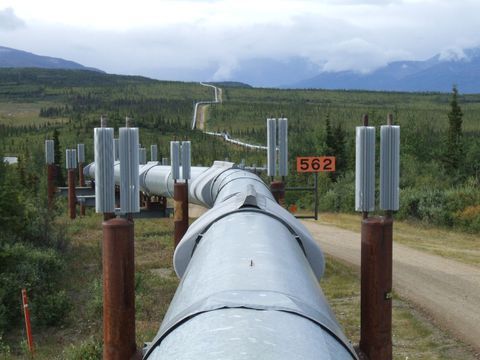
(Credit: Travis via Flickr)
On Wednesday, September 30, a group of reporters, business leaders and David Suzuki Foundation staff were treated to a conversation with renowned economist and author Jeff Rubin at the Foundation's Vancouver office. Prior to his standing-room only talk at the University of British Columbia, Rubin spoke passionately about the messages contained in his new book The Carbon Bubble, offering predictions about the future of the Canadian economy and the shift away from fossil fuels. The talk came only one day after Bank of England Governor Mark Carney spoke to Lloyd's of London about climate change posing huge risks to the stability of the global economy.
Rubin argued that placing all of Canada's economic hopes on oil sands production has been a mistake. The plummeting oil prices of the past year are only a taste of what is to come as nations work to reduce carbon emissions and limit global climate change to 2 C of warming with a binding agreement at the United Nations climate conference in Paris in December. Rubin laid out the facts of oil production in Canada, claiming that when global prices fall, either as a result of oversupply or shrinking demand, the first regions to cease production are the places where oil is most expensive to produce. Canada's oil reserves are among the most expensive in the world to bring to market and obtain some of the lowest profit margins, making growth in the oil sands uneconomical by any measure.
For those interested in growing Canada's capacity to produce natural gas, Rubin warned that the global market is unlikely to need or want what regions like B.C. would be able to produce. Asian markets, especially China, are often portrayed as Canada's future energy trading partners, but they're able to buy gas at 40 per cent of the Canadian price from countries like Russia, which are also looking to diversify their trade relations. At the same time the U.S., historically Canada's biggest trading partner, is ramping up its own production of natural gas, making it unlikely to buy what we're selling.
A shift away from oil and gas production is not bad news for the Canadian economy, however. According to Rubin, as production eases and the Canadian dollar loses value against the U.S. dollar, other major sectors of Canada's economy will start to boom. Industries like manufacturing, tourism and film production, which have suffered in the face of an increased focus on oil and gas, are likely to experience growth given that foreign investors will get more bang for their buck from Canadian goods. Another potential boom industry still in its infancy is renewable energy, which, according to Analytica Advisors, could generate $50 billion per year for the Canadian economy if we are able to achieve our fair share of global markets.
The cornerstone of Jeff Rubin's presentation, however, was the idea that Canada needs to put a price on carbon pollution at the national level. Rubin believes the most effective approach is a carbon tax. Carbon taxes, like the one in place in B.C., make pollution an economic liability for businesses and allow market forces to drive down emissions. Rubin said that B.C.'s revenue-neutral model, which gives the money raised back to taxpayers through annual income tax refunds, is well-structured and easy for the public to support. He did, however, argue that B.C.'s tax and any national carbon price it inspires should be increased from $30 per tonne of carbon pollution to $40 or $50 per tonne to drive down emissions faster and provide incentives for investment in clean-energy production.
As Canada continues to mitigate our contribution to global climate change and adapt to its impacts, the shape of our national economy is likely to change. Industries that have lagged in recent years are likely to come back and new industries like renewable energy and clean tech will likely move in to replace oil and gas. Fortunately, the jobs that will be generated in these new fields require many of the same skills at play in the oil sands today, making the transition for Canada's workforce an easy one. The shift will be rockier for companies that choose to build more fossil fuel infrastructure, as any capital will likely end up as stranded assets. Regardless of where our economy ends up, the message is clear: the smart money is in solar panels and not oil wells.
For more on the impact of Rubin's talk, see: http://davidsuzuki.org/blogs/election/2015/10/economist-says-oil-is-not-the-answer/
Hey! Want more DSF? Join David Suzuki on Facebook

Economist says oil is not the answer
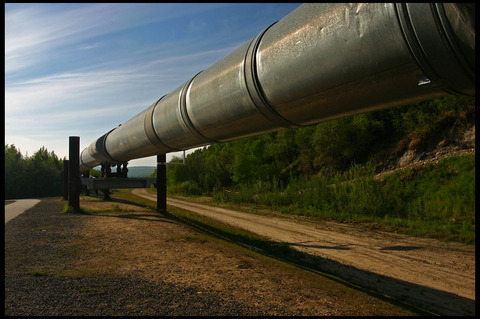
(Credit: rickz via Flickr)
Polls show Canadians are worried about the state of the economy. It's not surprising, when world oil prices continue to hover around $45 per barrel and Canada is one of the top six oil-producing nations, after Iran, China, the U.S., Russia and Saudi Arabia.
According to Jeff Rubin, former chief economist for CIBC World Markets and author of two best-sellers, Canadians are experiencing a made-in-Canada recession that should not have happened. For the audience, which included community leaders and ethnic media representatives at the David Suzuki Foundation's "Oil is not the answer" roundtable with Jeff Rubin September 30, this is valuable information and a fresh perspective.
More often than not, Canada's diverse communities are inundated by so-called pundits and political parties claiming the economy is the most important consideration, especially during election time. Rubin's messaging, which combines economic expertise and environmental concerns, helps new Canadian audiences appreciate the fact that anything less than a balancing act of economy and environment is untenable for our future.
Rubin reminded the audience that Canada has entered a carbon bubble because we have invested "all our eggs in one basket."
Rubin's visit also generated a number of media interviews, with the Globe and Mail, Global Television, Roundhouse Radio, Chinese Canadian Radio AM1320 and South Asian Spice Radio.
Rubin told the 280,000 readers of Ming Pao Daily, Canada's major Chinese language paper, about the impacts of climate change and the high cost of production for Canadian oil sands, which have made our oil industry's future untenable. A bursting carbon bubble leads to "deep and heavy" economic consequences for the country.
On Fairchild Television's evening news program, Rubin shared his views with a good portion of the 1.5 million Chinese-Canadians on why oil and carbon are not the answer for our future, environmentally or economically.
"When oil prices continue to drop, the oil industry has a lot of difficulty operating," Rubin said, adding China's energy demand will affect our fossil fuel industry. 'It doesn't matter who we sell our commodities to; the price of the commodities will be hugely affected by how much the Chinese are buying. Take coal for example. Last year was the first year China did not increase its coal consumption, or even dropped slightly. Well, that had a huge, dramatic impact on world coal prices."
China's economy has shown signs of slowing down in recent months. As well, the country is also moving rapidly into renewable energy investment, to the tune of $83 billion in 2014. These factors are bound to have an impact on demand for oil.
At the end of the Fairchild interview, the news program host concluded, "Based on the current oil prices, be it building oil pipelines, or developing oil in the Arctic, our new direction must put more weight on diversification, so as to lower the risk of world resource pricing that impacts Canadian economy."
To view Rubin's Fairchild Television feature interview - https://www.dropbox.com/s/2ncjwqzzt693exz/FTV20150929Political.mp4?dl=0
Hey! Want more DSF? Join David Suzuki on Facebook

October 8, 2015
Lick the plate: The ecological and economic costs of food waste
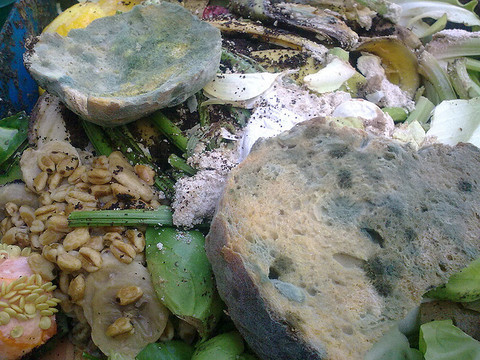
In Canada, food waste cost estimates increased from $27 billion to $31 billion between 2010 and 2014. (Credit: Nick Saltmarsh via Flickr)
Thanksgiving is a time to gather with friends and family to appreciate the bounty of the fall harvest. Eating is both a highly social and personal part of our lives, and food preferences can even make for lively dinner table conversations.
In North America we tend to focus on how food is grown and harvested. Consumers face a myriad of labels when they shop for Thanksgiving feasts -- organic, free range, cage-free, Marine Stewardship Council, fair trade, non-GMO, vegetarian-fed and locally grown among them. From a sustainability point of view, though, the most important question is missing from these labels: Will this food be eaten or will it end up contributing to the world's growing food-waste problem?
We're hearing a lot about food waste lately. Every year a staggering one-third -- 1.3 billion tonnes -- of the world's food is wasted after it has been harvested: 45 per cent of fruit and vegetables, 35 per cent of fish and seafood, 30 per cent of cereals, 20 per cent of dairy products and 20 per cent of meat. Food waste ends up in landfills, increasing methane emissions and contributing significantly to climate change. A recent study found Americans waste close to $200 billion on uneaten food while Canadians throw away $31 billion.
These figures only account for 29 per cent of the full cost of waste. They don't include factors such as labour, fuel to transport goods to global markets, inefficiency losses from feed choices used to produce meat and fish, or food left unharvested. As methodologies are improved and accounting becomes more inclusive, we're likely to find even higher waste figures. Dozens of studies across many countries with different methodologies not only confirm the increase in food waste but suggest food waste is even higher and on the rise. In Canada, food waste cost estimates increased from $27 billion to $31 billion between 2010 and 2014.
In a world where one in nine people doesn't get enough to eat -- many of them children -- this is unconscionable. According to the World Food Programme, poor nutrition kills 3.1 million children under the age of five every year. It's the cause of almost half of child deaths in that age range. When it comes to feeding the world, distribution and waste appear to be greater problems than population. And yet we continue to destroy more forests, drain more wetlands and deplete the oceans of fish to meet the needs of a growing world population.
Not only that, the monumental economic losses from food waste represent money that could be used to fund much-needed social and environmental programs. Money lost in North America would cover most of Canada's federal budget. Food waste in Metro Vancouver homes adds about $700 a year to a household's grocery bill.
Every morsel of food wasted represents unnecessary greenhouse gas emissions, conversion of natural ecosystems to agricultural lands and disruptions to marine food webs. Based on 2007 data, the UN estimates that the equivalent of 3.3 gigatonnes of CO2 emissions globally can be attributed to food waste. Canada's total emissions, in comparison, are about 0.7 gigatonnes. If food waste were a nation, it would be the world's third-largest emitter.
We need to tackle food waste at all levels, from international campaigns to individual consumption habits. In September, the UN agreed to an ambitious global goal of reducing food waste by 50 per cent by 2030 as both an environmental and humanitarian imperative. Earlier this year, Metro Vancouver joined the international effort Love Food Hate Waste to meet municipal waste goals and encourage individual behavioural change. A similar U.K. campaign led to a 21 per cent cut in food waste over five years. Grocery stores in France and other countries are offering discounts for misshapen produce under an "ugly fruits and vegetables" campaign. Businesses are using audits to map out where food waste is affecting bottom lines.
Food waste is a crime against the planet and the life it supports. Reducing it not only addresses food insecurity, it benefits everyone. This Thanksgiving dinner, whether you're vegan, vegetarian, carnivore, locavore or pescetarian, plan for a zero-food-waste meal. Show thanks for ecosystems, growers and harvesters by buying only what you will eat and eating all that you buy.
Hey! Want more DSF? Join David Suzuki on Facebook

October 6, 2015
David is turning 80! Toronto celebration

Hey! Want more DSF? Join David Suzuki on Facebook

October 1, 2015
Volkswagen scandal is a sorry sign of the times
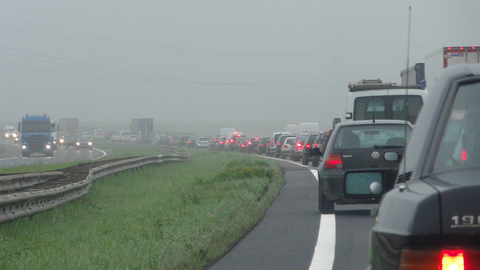
(Credit: Erik bij de Vaate via Flickr)
Volkswagen was caught cheating on U.S. Environmental Protection Agency emissions tests by installing "defeat devices," which allowed its diesel vehicles to pass nitrogen oxide emissions checks but spew up to 40 times allowable pollutants once they were completed. The scandal has resulted in plummeting share prices, CEO Martin Winterkorn's resignation and up to $18 billion in fines, as well as recalls, stop-sale orders, impending lawsuits and possible criminal charges.
Beyond the betrayal and legal and financial issues, the effect on global pollution is massive. Volkswagen is the world's largest automaker by sales, and as many as 11 million of its diesel vehicles are implicated. According to the Guardian, "The rigging of emissions tests may have added nearly a million tonnes of air pollution by VW cars annually -- roughly the same as the UK's combined emissions for all power stations, vehicles, industry and agriculture."
Nitrogen oxide pollution creates particulate matter that causes respiratory problems and is linked to millions of premature deaths every year worldwide. It's also a greenhouse gas more potent than carbon dioxide and so contributes to global warming.
The Volkswagen debacle is bad enough in itself, but it also raises questions about automaker practices, pollution, emissions standards and testing and the implications of our rampant car culture. Volkswagen cheated on regulations designed to protect human health and the environment, and the consequences are increased rates of asthma, lung disease, cancer and death. But it's not just diesel cars and it's not just vehicles from one company. Cars kill and harm millions of people every year, with accidents, pollution, climate change and other environmental damage. And car-makers have in the past resisted safety improvements such as seatbelts and air bags.
Illegally rigging vehicles to pass emissions tests hurts everyone, but legal loopholes create similar problems. Just look at SUVs. I did a quick count of the many passing my office during the afternoon, and almost all contained a single driver -- no passengers or even pets! Under emissions laws in Canada, the U.S., Japan and elsewhere, SUVs are classified as "light-duty trucks" and are subject to less strict emissions standards than cars. Yet, most people treat them the same as cars.
This creates incentives for manufacturers to produce more heavy vehicles or even to design cars as trucks, such as Chrysler's PT Cruiser. According to the Economist, "As vehicles above 3.8 tonnes were long exempted from the American regulation, manufacturers started producing enormous vehicles such as the Hummer to avoid any fuel-economy rules."
Even with fuel-efficiency improvements, vehicle emissions have more than doubled since 1970 and will increase as demand rises in countries like China, India and Brazil, according to the Intergovernmental Panel on Climate Change. Studies show that because fuel efficiency makes it less expensive to drive, people drive more. Clearly, we need better solutions.
It's easy to say it starts with individuals. We can all find ways to reduce private automobile use. But individuals aren't entirely to blame for our fossil-fuelled lifestyles. Incentives, regulations, policies and infrastructure are needed to create the necessary shift away from reliance on wasteful, inefficient transportation and fuel options.
We've seen many positive developments in recent years. In my hometown, Vancouver, and many other cities, car-sharing programs and cycling and pedestrian infrastructure are expanding rapidly. Hybrid and electric vehicle technologies are making great inroads. Recognition of the need for efficient public transit is also spreading around the world. And fuel taxes and carbon pricing have been proven effective at reducing reliance on private automobiles.
Taxing fossil fuel consumption may be more efficient than emissions standards because, as the Economist points out, fuel taxes encourage people, especially those who drive a lot, to buy more efficient cars and to drive less. And, "A fuel tax does not rely on dubious testing nor does it create distortive loopholes." Revenue from taxes can be invested in cleaner transportation alternatives or, as with B.C.'s carbon tax, used to reduce income taxes or provide rebates to people with lower incomes.
It's outrageous that a car manufacturer like Volkswagen would stoop to devious practices to get around laws designed to benefit all people, but in our car-driven culture, it's not entirely surprising -- just another signal that it's time to rethink the way we move ourselves around.
Hey! Want more DSF? Join David Suzuki on Facebook

David Suzuki's Blog
- David Suzuki's profile
- 247 followers



